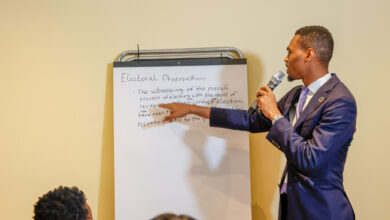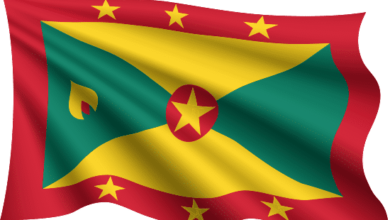LONDON, Feb 12, CMC –The London-based Privy Council Thursday ruled that the St. Kitts-Nevis elections on February 16 will be held using the old voters list and the existing boundaries.
The five-member panel of judges said it would later provide a written judgement.
The Privy Council was asked to rule on whether or not the Easter Caribbean Court of Appeal was correct to uphold the discharge of an interim injunction preventing the adoption of new electoral boundaries ahead of the February 16 general elections.
In its ruling, the Privy Council, which is the final court for the twin-island Federation, said after consideration of the appeal made by the Eastern Caribbean Court, it will allow the appeal filed by the opposition legislators.
“The Order made by Madam Justice Carter (High Court judge) on January 27, 2015 and the Court of Appeal on the 5th February 2015, be set aside and the interim injunction granted by Madam Carter on the 16th of January 2015 be restored”.
The Privy Council noted that both parties had in their agreement an undertaking “agreed to use for the purposes of the forthcoming general election due to take place on Monday 16th February whatever list the Privy Council may determine as the appropriate list, it is determined and ordered that firstly, the list to be used in the said election, is and shall be that existing prior to and apart from the proclamation bearing the reference number two of 2015 purportedly issued and published by the Governor General….bearing the date January 16, 2015.
The Privy Council said any effect that the said proclamation “would continue otherwise to have whether in relation to any other election or otherwise is hereby suspended until further order”.
It said that “all further questions regarding the said proclamation or otherwise and all questions of costs be reserved”.
The Privy Council ruling Thursday came after it heard submissions Wednesday from attorneys representing four opposition politicians and those representing the Constituency Boundaries Commission, Prime Minister Dr. Denzil Douglas and the island’s attorney general, the five-member panel of judges reserved their ruling to 1400 hours (local time) on Thursday.
The Privy Council was told that by a proclamation dated January 15 this year, Governor General Sir Edmund Lawrence sought to adopt new electoral constituency boundaries shortly before the elections scheduled for Monday.
However the opposition legislators were successful in getting an ex-parte injunction on the same day to prevent such an injunction being made, but it was set aside on January 27 on the grounds that the proclamation had been made before the issue of the injunction and was therefore useless.
The Court of Appeal upheld the discharge of the interim injunction.
The attorneys representing the respondents, including Prime Minister Douglas, said because of the impending general election “a political agenda is being played out before the courts and we very respectfully urge the Lordships …that as a matter of law on the evidence that’s there the proclamation wasn’t made out, I cannot see how that can actually be said…but otherwise respectfully I urge your Lordships if that isn’t the answer then your Lordships should not grant any injunction.
“Your Lordships should allow the election to play out, it may be after the election there is nothing left to argue about because there is no one who needs to argue about it, if the opposition and government changes.
“It may be there is still something to argue about in which case that can happen in my respectful submissions through election petitions if it can happen at all,” the lawyers argued.
“And for those reasons my Lord we respectfully urge your Lordships to let the people in Basseterre and Charlestown on St. Kitts-Nevis now reach their decision on who they want to govern them and leave the legal wrangling behind”.
But the attorneys for the appellants, Mark Brantley of the Concerned Citizens Movement; Timothy Harris and Sam Condor of the People’s Labour Party and Shawn Richards of the People’s Action Movement, argued that the sequent of events showed that there was a strategy by the government to implement the new measures ahead of the polls.
“If we are right about the sequence of events and the proclamation came after the court order, then it is completely inappropriate to do that because one can see now that…the proclamation was made wrongfully,” the attorneys argued, disagreeing with a suggestion that the right way to complain about the matter is through election petitions.
“My Lord as we pointed out this would presuppose effectively that one should have election petitions in every single area,” they said, adding if in fact an action is done in contempt of a court order, “no legal effect can or should be given to it and it is perfectly open to this court in the exercise of its jurisdiction…to quash the proclamation made in breach of the order,” the lawyers argued.





